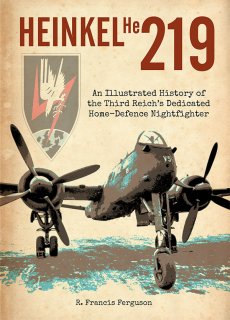Home > All Titles > Adult Non-Fiction > Aviation & Military > Aviation Books > Heinkel He219 – The Illustrated History

An Illustrated History of the Third Reich’s Dedicated Home-Defence Nightfighter
This new book is the product of a lifetime interest in the subject – and extensive research spanning more than a decade. Writing started in 2012, shortly after the publication of the ‘He 219 Research Paper’ when a number of readers suggested that he should have written the definitive history of the type. At that time, however, Ron felt that he did not have sufficient depth of knowledge. The Research Paper was a “… first step in setting right the historical record” – a first step only.
However, publication of the Research Paper brought forth new photos, documents and information. This ultimately developed into this new work, which gives the reader a comprehensive and highly detailed study of the Heinkel He 219.
This is an academic limited edition from the specialist publisher Air Research inended for the serious Luftwaffe enthusiast and historians and will only be produced in limited numbers.
The Heinkel He 219
The He 219 was in many respects unique. It was the world’s first series-built aircraft to be fitted as standard with an ejection seat – and not just one seat, but two. It was also unique in that it was designed and built as a dedicated nightfighter for home-defence duties. This came at a time when the prevailing military mind-set was almost exclusively fixed on the offensive role of aircraft. And, because of this mind-set, the He 219 was plagued by uncertainties that affected production and development. The He 219 was also unique for its tricycle undercarriage which came at a time when tail-draggers were common. Sometimes likened to a praying mantis, the very look of the He 219 with its nose-mounted dipoles gave just a small hint of its fearsome reputation in the night air war over continental Europe. In May 1940 RAF Bomber Command took the decision to go over to the strategic night bombing of Germany. The later introduction of four-engined heavies, the Stirling, Halifax and Lancaster, into Bomber Command operations saw an increase in the frequency and intensity of bombing raids. The Heinkel He 219 with its heavy firepower was quickly rushed into frontline service but like so many weapons of the time it came too late, and in insufficient numbers, to change the course of the conflict.